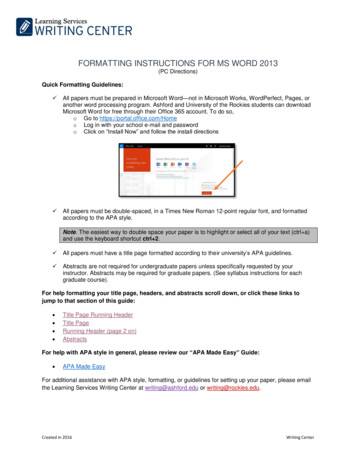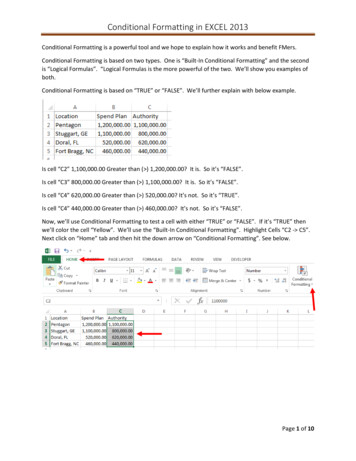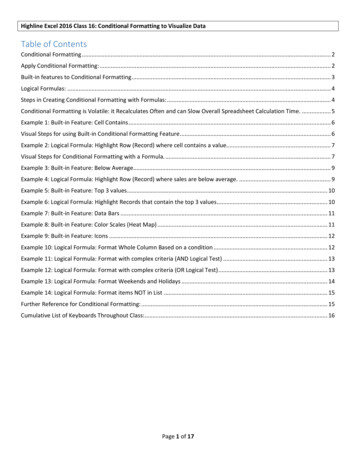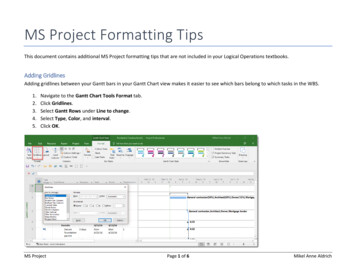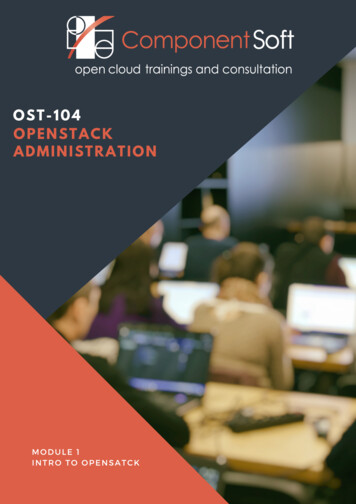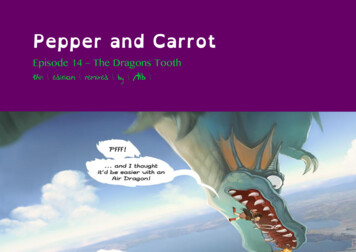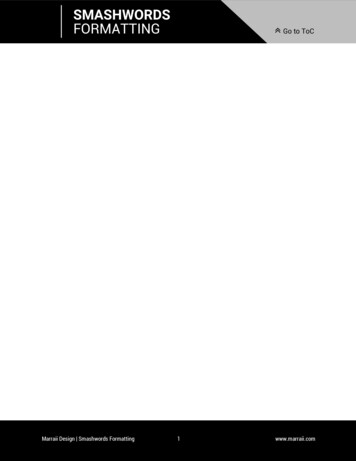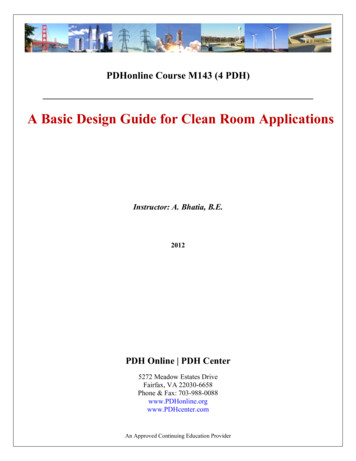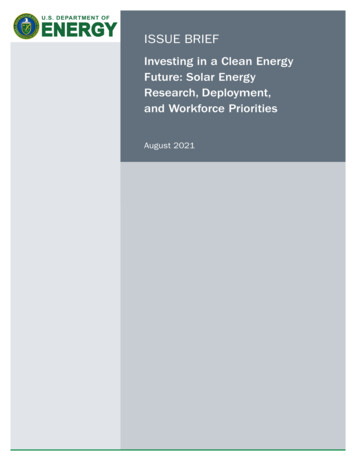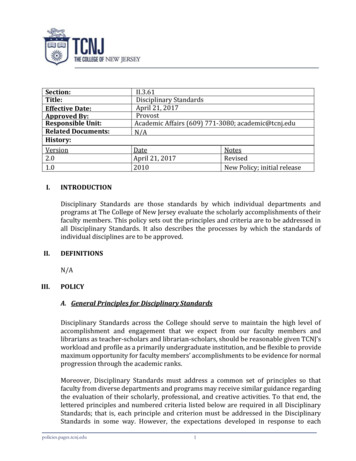
Transcription
Section:Title:Effective Date:Approved By:Responsible Unit:Related ry StandardsApril 21, 2017ProvostAcademic Affairs (609) 771‐3080; academic@tcnj.eduN/ADateApril 21, 20172010NotesRevisedNew Policy; initial releaseINTRODUCTIONDisciplinary Standards are those standards by which individual departments andprograms at The College of New Jersey evaluate the scholarly accomplishments of theirfaculty members. This policy sets out the principles and criteria are to be addressed inall Disciplinary Standards. It also describes the processes by which the standards ofindividual disciplines are to be approved.II.DEFINITIONSN/AIII.POLICYA. General Principles for Disciplinary StandardsDisciplinary Standards across the College should serve to maintain the high level ofaccomplishment and engagement that we expect from our faculty members andlibrarians as teacher‐scholars and librarian‐scholars, should be reasonable given TCNJ’sworkload and profile as a primarily undergraduate institution, and be flexible to providemaximum opportunity for faculty members’ accomplishments to be evidence for normalprogression through the academic ranks.Moreover, Disciplinary Standards must address a common set of principles so thatfaculty from diverse departments and programs may receive similar guidance regardingthe evaluation of their scholarly, professional, and creative activities. To that end, thelettered principles and numbered criteria listed below are required in all DisciplinaryStandards; that is, each principle and criterion must be addressed in the DisciplinaryStandards in some way. However, the expectations developed in response to eachpolicies.pages.tcnj.edu1
criterion will vary across departments/programs, and it is possible that some criteriawill be deemed inapplicable by a given department or program. For example, eachDisciplinary Standards document will outline expectations regarding involvement ofstudents in faculty/librarian scholarship; however, the expectations outlined byindividual departments/programs are likely to differ. Moreover, each criterion may beaddressed in multiple ways. For example, regarding the evaluation of the quality ofscholarly or creative products, one department may define appropriate outlets in termsof objective criteria such as impact factors, whereas another department may providelists of preferred and acceptable outlets. This flexibility allows departments andprograms to develop unique and appropriate Disciplinary Standards.Disciplinary Standards are intended to:1. guide new faculty and librarians in their quest for reappointment, tenure, andpromotion within the teacher‐scholar/librarian‐scholar model;2. to promote the development of tenured faculty and librarians as teacher‐scholars/librarian‐scholars;3. guide the Promotion and Reappointment Committee (PRC) in evaluatingcandidates for reappointment, tenure, promotion, and periodic post‐tenurereview; and4. foster an environment that supports faculty and librarians dedicated to themissions of TCNJ and their respective departments and programs.B. Guiding Principles for Drafting Disciplinary Standards Documentsi.All Disciplinary Standards must include minimum expectations for scholarshipfor:1. reappointment during the probationary period, tenure, and promotion.ii.Since 2015, the reappointment of Assistant Professors or Librarians III to the7th year (tenure) is awarded with promotion to Associate Professor orLibrarian II, respectively. Thus, departments and programs must defineminimum expectations in the disciplinary standards for:1. reappointment, tenure and/or promotion to Associate Professor or Librarian II,and promotion to Professor or Librarian I.iii.Expectations for reappointment are normally defined for Assistant Professors orLibrarians III, although TCNJ also hires faculty at the Associate Professor orLibrarian II and Professor or Librarian I levels. Expectations may be defined ingeneral or for each of the years of the probationary period. Note that thePromotion and Reappointment Document also contemplates faculty applying forearly promotion or tenure.iv.Expectations for tenure are normally defined for untenured Assistant Professorsand Librarians III; in these cases, tenure will be accompanied with promotion toAssociate Professor or Librarian II. An untenured Assistant Professor orpolicies.pages.tcnj.edu2
Librarian III applying for tenure or an untenured Associate Professor orLibrarian II applying for promotion must meet these same expectations;similarly, a tenured Assistant Professor or tenured Librarian III applying forpromotion to Associate Professor or Librarian II must meet these sameexpectations.v.Expectations for promotion to Professor or Librarian I must be met by anytenured or untenured faculty seeking promotion to Professor or Librarian I andby untenured Professors or Librarians I seeking tenure.C. Required Elements for Disciplinary StandardsThe following are the required elements for all department and program DisciplinaryStandards.i.Alignment with Key Institutional Documents and ValuesAll Disciplinary Standards must be consistent with:1. The Mission of the College, School, and Department/Program2. The identity of TCNJ as a primarily undergraduate institution with a selectnumber of targeted masters programs3. The expectation that faculty members are to be accomplished and engagedteacher‐scholars and/or librarian‐scholars and students are to be accomplishedand engaged learners4. The Promotion and Reappointment Documentii.Categories of Acceptable Scholarly/Professional/Creative WorkAll Disciplinary Standards must include:1. Clear articulation of the range of tangible scholarly outcomes recognized in thediscipline (e.g. journal papers, books, conference proceedings, exhibits,performances, grants and grant proposals, conference presentations, invitedlectures)2. Clear articulation of the range of modes of scholarship (e.g. Boyer; scholarship ofdiscovery, scholarship of application, scholarship of pedagogy)3. Flexibility in support of diverse paths in scholarship/professional/creativeactivity4. Recognition of discipline‐specific challenges for scholarship in the given field (e.g.international travel for some fields)5. Clarity and flexibility of criteria to evaluate the quality of the venue in whichscholarship is disseminated; flexibility to allow for the establishment of newvenues and genres (e.g. emerging online venues)policies.pages.tcnj.edu3
6. Recognition of interdisciplinary work, when it is offered as part of a promotion orreappointment application, and indication of how to evaluate itiii.Criteria to Evaluate Different Types of Scholarly/Professional/Creative WorkAll Disciplinary Standards must include:1. Clarity and flexibility of criteria to evaluate the quality of differentscholarly/professional/creative products2. Criteria to evaluate scholarship in the context of our College’s value ofteaching/librarianship3. Clear articulation of criteria for assessing the contribution of a scholar’s researchagenda disseminated in non‐traditional formats.iv.Scope, Quality, Importance, and Coherence of Scholarly/Professional/CreativeProgramAll Disciplinary Standards must include:1. Clear articulation of how the department/program evaluates the scope (regional,national, international), quality, and importance of ascholarly/professional/creative project (e.g. not all disciplines have quantitativeimpact factors, but all disciplines can evaluate importance qualitatively)2. Indication of the value of student involvement in, or the contribution to,scholarly/professional/ creative work3. Clear articulation of productivity expected (i.e. provide guidepost numbers, nothard and fast numbers)4. Clarity for evaluating the quality and coherence of a sustained and ongoingprogram of scholarly/professional/creative work that matures over timev.Authorship:All Disciplinary Standards must include:1. Clear articulation of the ways in which the department/program evaluatesdifferent authorship patterns (e.g. single author v. multiple author) inscholarly/professional/creative projects2. Clear articulation of how the department/program evaluatesscholarly/professional/creative work that results from smaller vs. larger scaleprojects.policies.pages.tcnj.edu4
D. Establishing Consistent Quality of Disciplinary Standards Documentsi.All departments and programs will review and revise the existing DisciplinaryStandards according to the general principles every 5 years in a staggered multi‐year pattern. The following process must be followed to ensure that allDisciplinary Standards documents address the principles and criteria outlinedabove.1. During the Spring semester, departments or programs with a 5‐year periodicreview due in the next academic year will revise their previously developedDisciplinary Standards in accordance with the principles outlined in thisdocument. This process will be initiated by the Dean and will involve consultativeconversation among all faculty members in the department or program. Therevised Disciplinary Standards will be approved by departmental/programfaculty members via vote in accordance with departmental/program policy. TheDepartment Chair will sign the approved document on a draft of the cover page.2. The revised Disciplinary Standards will be submitted to the Dean of each School.The Deans will review the Disciplinary Standards submitted from theDepartments of their own Schools, returning to Departments any DisciplinaryStandards that need to be revised for resubmission because they do not meet thecriteria set forth in this document. For instance, revision will be needed if theDisciplinary Standards fail to address each required criterion described above. Acover sheet must be included with the Dean’s signature indicating approvalbefore it is submitted to the Committee on Faculty Affairs (CFA). Upon approvalby the Dean, the Disciplinary Standards will be forwarded by the Dean to CFA.3. If revisions are needed, CFA will send the Disciplinary Standards back to theDepartment and copy the Dean. Upon approval by the Dean and then CFA, theDisciplinary Standards will be forwarded by CFA to Academic Affairs.4. The Council of Deans and the Provost will review the Disciplinary Standards toassure that they meet the criteria set forth in this document. Review will becompleted by the end of the academic year.5. The Dean, CFA, Council of Deans, and/or the Provost may indicate the need forfurther conversation and revision of Disciplinary Standards bydepartmental/program faculty. In such cases, the Disciplinary Standards willagain go through steps 1–4 above.policies.pages.tcnj.edu5
6. The relevant Dean and the Provost will sign the cover page of final version of theDisciplinary Standards, confirming with their signatures that the DisciplinaryStandards meet the criteria set forth in this document and therefore will be usedin reviewing promotion and reappointment applications. Academic Affairs willpost the signed Disciplinary Standards online, along with the date of the revision.Disciplinary standards can only be posted on the Academic Affairs website andnot on School or Departmental webpages.7. If any future substantive changes are made to a Department’s/Program’sDisciplinary Standards, the revised Disciplinary Standards must undergo theprocess of review described here.E. Appropriate Disciplinary Standards for Use in Reappointment and PromotionTo avoid creating a moving target for candidates for reappointment, the DisciplinaryStandards in effect by the end of a faculty member’s first year of employment will be usedfor reappointment and tenure applications in Years 1–5. Candidates for Promotion willuse the Disciplinary Standards in effect in the year in which they apply for promotionpolicies.pages.tcnj.edu6
2. The identity of TCNJ as a primarily undergraduate institution with a select number of targeted masters programs 3. The expectation that faculty members are to be accomplished and engaged teacher‐scholars and/or librarian‐scholars and students are to be accomplished and engaged learners 4.

